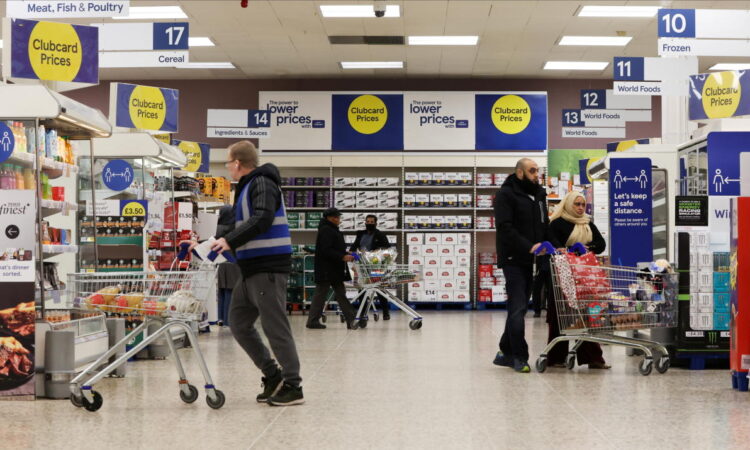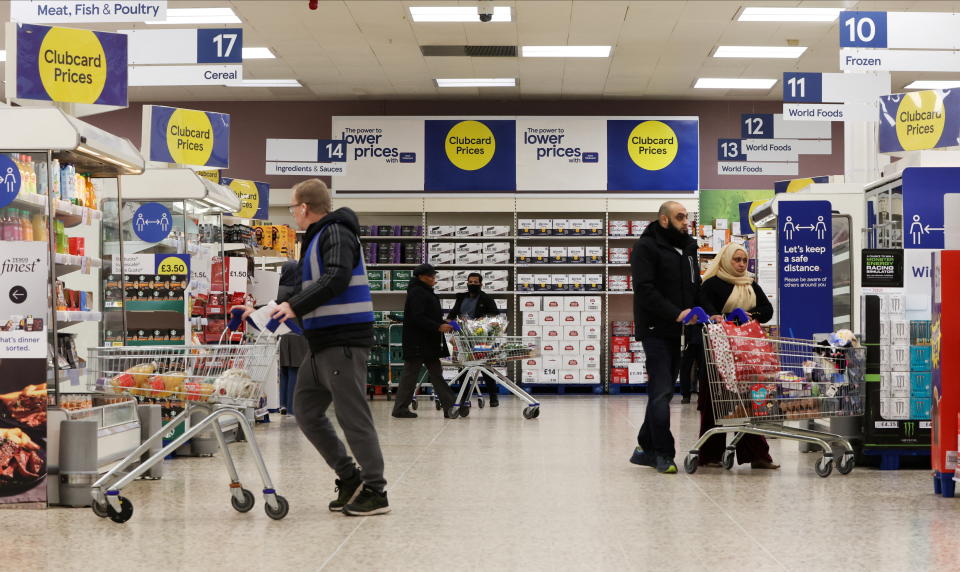

Tesco (TSCO.L) has reported a jump in yearly sales but profits halved in what the grocer called an “incredibly tough year for customers”
While its sales rose 7.2% to £65.7bn, pre-tax profits dropped from just over £2bn to around £1bn, as shoppers made more trips to the supermarket but bought fewer items.
Bosses said the supermarket giant had come under pressure from rising prices as its customers also struggled under soaring inflation.
“It’s been an incredibly tough year for many of our customers, and we have been determined to do everything we can to help,” said chief executive Ken Murphy.
“Our results reflect our continued investment in delivering great value and quality for our customers, whilst at the same time looking after our colleagues.
“This is despite unprecedented levels of inflation in the prices we have paid our suppliers for their products, and the cost of running our own operations.”
Sales of food in the UK rose 4.6% in the year, led by the group’s own-label ranges, with sales of its premium Finest range up nearly 7% and its cheapest “Exclusively at Tesco” range up 6%.
Read more: Sainsbury’s announces big change for Nectar card holders
Zoe Gillespie, investment manager at RBC Brewin Dolphin, said: “Tesco is continuing to cement its position as the UK’s top supermarket.
“Profits may be down, but that was to be expected from the pressures of the cost-of-living crisis and post-pandemic normalisation in shopping habits.
“Sales growth, meanwhile, remains robust and Tesco is well placed to benefit from consumers looking to save on their weekly shop through its different initiatives – particularly its Clubcard scheme.
“While profits are expected to be flat for the year ahead, the continuation of its share buyback scheme and strong execution of its strategy mean Tesco remains in good shape.”
Shareholders will receive a dividend of 7.05p a share worth £516m in June, with the company also announcing plans for a buyback of its shares worth £750m.
The FTSE 100 stock, which has been trading at an eight month high in recent sessions, rose 2.34% to 273.6p as investors also welcomed plans for a further buyback of shares.
Richard Hunter, head of markets at Interactive Investor, said: “With the current challenges unlikely to abate in the medium term, Tesco is guiding for flat retail profits in the year ahead, being extremely mindful that any lessening of its focus could have an immediate and damaging impact. While the company remains the one to beat in terms of size in the UK, growth is also increasingly hard to come by given the higher base.
“Indeed, the share price has struggled to make much progress of late. Despite a bounce of 34% over the last six months, the shares remain down by 1% over the last year, as compared to a gain of 3.2% for the wider FTSE100. The three-year performance is rather more respectable, with the shares having added 20% and investor optimism has not dwindled in the face of such aggressive competition. The market consensus of the shares as a strong buy is testament to the esteem in which many investors still hold the stock.”
AJ Bell investment director Russ Mould added: “Holding on to customers in a cost of living crisis is no joke, even for a company with the scale and purchasing power of Tesco. The company is having to take a hit on profit and margins to keep the tills ringing and customers heading through its doors.
“This hit is even more acute because Tesco is itself exposed to higher labour and energy costs. Online groceries, which finally started to make a positive contribution during the pandemic will also be heavily impacted by smaller basket sizes as the costs for Tesco of delivering the goods don’t change in proportion to the amount ordered.
“Tesco seems to be making the calculation that it can absorb some pain now to maintain and even improve its market share, particularly from the German discounters Aldi and Lidl, and emerge in a stronger position once the economic outlook starts to pick up.
Read more: UK’s cheapest supermarket revealed
“There is merit to this strategy, particularly at a time when rivals, most notably Morrisons, are really struggling and don’t have Tesco’s financial strength.
“What Tesco doesn’t want to be drawn into is a race to the bottom on prices which cuts margins right to the bone for a prolonged period. For now, this is the tricky tightrope the supermarket must walk, while rewarding investors for their patience with steady dividends.”
Sue Davies, Which? head of food policy, said: “These results show Tesco is doing very well during the cost of living crisis, while millions of its customers struggle to put food on the table due to soaring grocery price inflation. It’s clear that Tesco and all the major supermarkets could be working harder to make food more affordable for customers who need help.
“While we want to see British businesses do well, Tesco has an important role as the UK’s largest supermarket to lead the way on making affordable ranges of healthy, nutritious food more widely available, especially in those areas most in need. The supermarket should also be making pricing clearer, more transparent and more consistent, particularly on Clubcard offers, so consumers can easily compare prices in-store and with other supermarkets.”
Watch: Tesco warns of ‘unprecedented’ inflation but drops price of milk
Download the Yahoo Finance app, available for Apple and Android.






